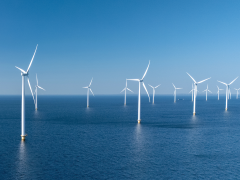On the optimality of 2°C targets and a decomposition of uncertainty
The overall target of climate policy and the timing of emission reductions are key policy issues. The high degree of uncertainty in key aspects, such as climate damage, mitigation costs and socio-economic assumptions, makes it challenging to derive robust conclusions. A new study by PBL researchers, published in scientific journal Nature Communications, shows nevertheless that limiting global warming to well below 2°C is nearly always the optimal target - even from a strictly economic viewpoint.
The objective of the Paris Agreement is to keep global mean temperature to well below 2°C and preferably even at 1.5°C above pre-industrial temperatures. This, however, does not mean that it is not worthwhile to look at climate policy’s ambition level. Current nationally determined contributions (NDCs) are not in line with the overall objective, and implementing the enormous transformation to achieve the climate targets needs wide-spread societal support. From a purely economic perspective, the cost-optimal goal depends on the costs and benefits of climate policy. This is, in turn, determined by the interplay between certain key factors, including socio-economic developments, climate system uncertainty, damage estimates, mitigation costs and discount rates. Each of these factors are uncertain.
This new article’s contribution consists of the fact that the authors relate the uncertainty of each of these key factors to the full range of information currently available in the literature, and subsequently look at the possible implications. The article investigates the influence of each factor on the cost-optimal timing of mitigation efforts that are required to comply with the Paris Agreement. Moreover, the framework developed in the article is used to calculate which temperature target would be economically optimal: 2°C, the more stringent 1.5°C or perhaps yet another target.
Stronger initial mitigation action required when also taking climate damage into account
Current carbon price trajectories for achieving the 2°C target, as used by the IPCC, are calculated by taking only mitigation costs into account — the costs involved in CO2 emission reductions. Such trajectories, therefore, do not consider any damage to the climate over the remainder of this century. The authors show that taking this damage from climate change into account means that stronger initial action is required; for a cost-optimal pathway to achieve the 2°C temperature target, the initial carbon price would need to be twice as high as that of the pathway in which this damage is not taken into account.
This optimal initial carbon price mainly depends on the level of uncertainty on mitigation costs, time discounting and damage costs.
The benefits of the Paris target are significantly higher than the economic costs
The study also compares the benefits of mitigation measures (reduction in climate impacts) against the costs of reducing global CO2 emissions. When determining the economically optimal climate target, the combination of mitigation costs and residual damage costs need to be kept as small as possible. The benefits of limiting global temperature increase to 2°C are significantly larger (reduced residual damage costs) than the related costs, for nearly all uncertain parameter combinations. Higher temperature targets and, therefore, less stringent mitigation measures, would result in significantly higher total costs (combination of mitigation costs and residual damage), and are therefore economically unattractive.
With a discount rate in the lower ranges of the current literature, the more stringent target of 1.5°C is preferred over that of 2°C, from an economic point of view, except when the climate damage is assumed to be very low.
In general, for all parameter combinations except the very low damage estimations, the cost-benefit optimal temperature target is in line with that of the Paris Agreement, which is keeping global mean temperature increase to well below 2°C.
Authors
Specifications
- Publication title
- On the optimality of 2°C targets and a decomposition of uncertainty
- Publication date
- 6 May 2021
- Publication type
- Article
- Publication language
- English
- Magazine
- Nature Communications
- Issue
- 12, Article number: 2575 (2021
- Product number
- 4651




